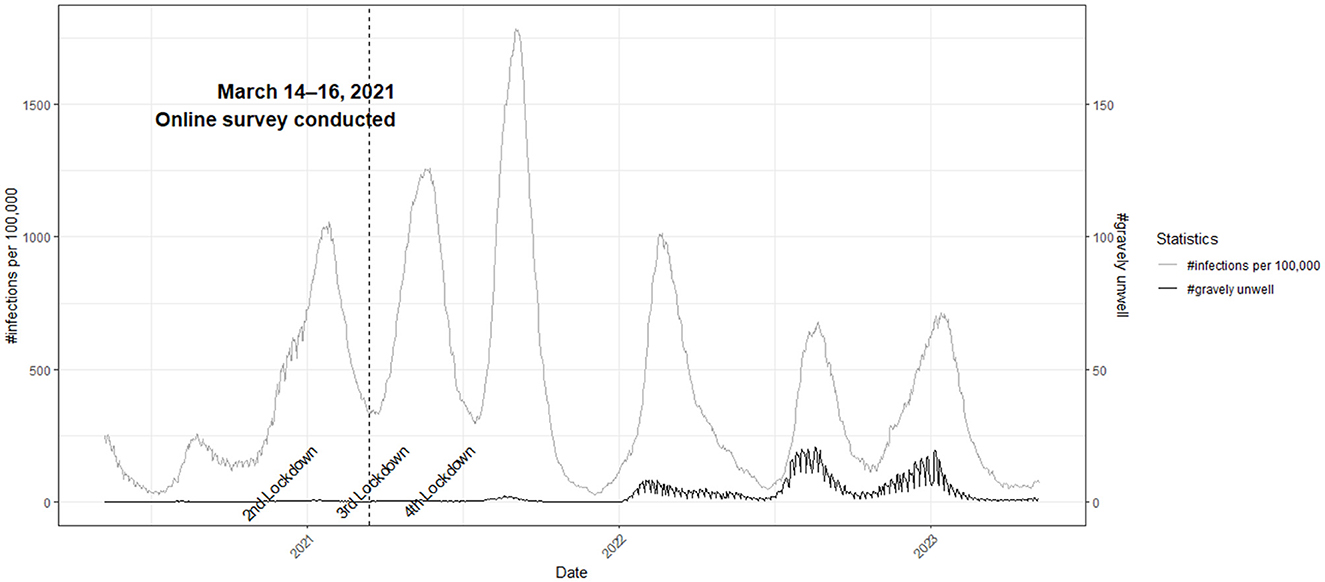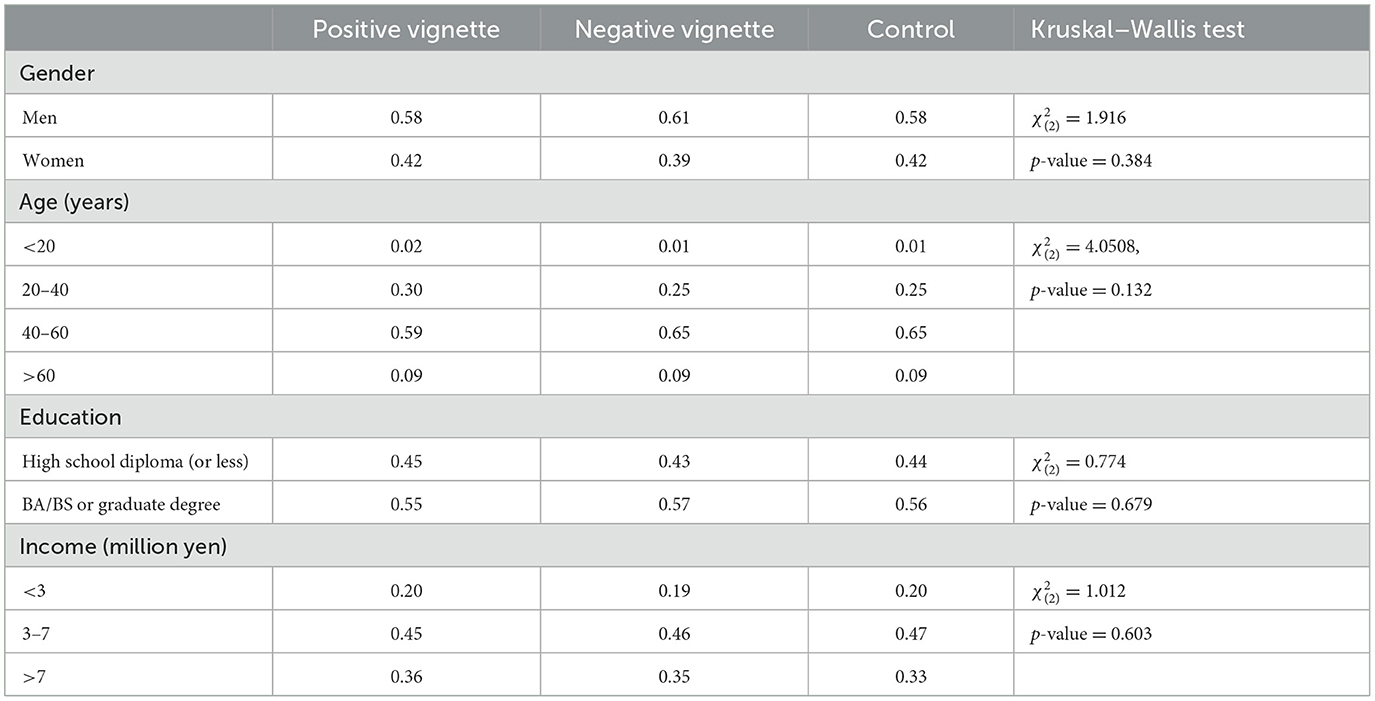Cognitive bias in voters' retrospective evaluations associated with COVID-19: evidence from Japan
- School of Policy Studies, Kwansei Gakuin University, Sanda, Japan
Retrospective voting studies on catastrophic disasters can entail cognitive biases and politically affected approval/disapproval toward the government. In this study, I conducted an online survey experiment to assess the impact of providing individuals with information about COVID-19 infection status on their attitudes toward the government, governor, local administration, and national/local economic policies (n = 2,975). The findings indicated that the group exposed to positive information regarding infection status demonstrated a higher likelihood of adopting positive attitudes, while the group exposed to negative information showed a higher likelihood of adopting negative attitudes, despite receiving no other information. Although it was expected that individuals residing in prefectures with regular appearances of the governor on mass media platforms and that obtained COVID-19-related funding from the government would have a greater likelihood of experiencing such an attitude change, the findings do not corroborate these hypotheses.
1 Introduction
Social scientists face the challenge of identifying how voters' assessments of government performance are influenced by unforeseen external events (Huber et al., 2012; Healy and Malhotra, 2013; Bullock and Lenz, 2019). The evaluation of government performance, particularly in the economic domain, is a complex task that demands a high level of cognitive load and is susceptible to external influences (Healy et al., 2010; Achen and Bartels, 2018). By examining the effects of sudden events, researchers delve into the mechanisms behind attribution errors in retrospective and economic evaluations (Huber et al., 2012; Remmer, 2014; Ramos and Sanz, 2020).
Events not caused by the government's policy blunders can influence voters' attitude formation and overly promote their approval of its economic policies. Specifically, hurricanes (Malhotra and Kuo, 2008, 2009; Eckel et al., 2009; Malhotra and Margalit, 2014; Fowler and Hall, 2018), earthquake and tsunami damage (Carlin et al., 2014; Cameron and Shah, 2015; Katz and Levin, 2016; Cassar et al., 2017; Acuña-Duarte and Salazar, 2021), natural disasters in coastal areas (e.g., shark attacks; Achen et al., 2018), and floods (Bechtel and Hainmueller, 2011; Cole et al., 2012; Bodet et al., 2016; Heersink et al., 2017) can all affect economic evaluations, risk attitudes, and, finally, political attitudes (e.g., the approval of government performance/economic evaluation). Despite the limited or lack of human intervention in the occurrence of the event itself, subsequently controlling the spread of the damage is influenced by the government's financial expenditure on disaster reconstruction and public health measures (e.g., Healy and Malhotra, 2009; Cole et al., 2012).1 In other words, the responsibility for the socioeconomic instability caused by the disaster is attributed to a mixture of governmental and non-governmental blunders, and this further complicates how voters attribute responsibility. As it is difficult for voters to differentiate between non-human-induced instabilities not caused by the government and human-induced instabilities caused by the government, it has been assumed that the emphasis on blunders in damage control lowers support for the government and its handling of economic policy.
The COVID-19 outbreak displayed properties similar to those of natural disasters.2 The early stages of the outbreak could not be controlled, while national and local governments subsequently intervened to control the public health response and economic damage caused by its spread (cf. Daniele et al., 2020). From this perspective, the COVID-19 case inherits the essence of the literature that has examined the relationship between natural disasters and cognitive bias and is important for examining the impact of non-human-induced events on voters' cognition of economic conditions.
However, COVID-19 has more complex attributes than previously studied areas of catastrophic events. Damage from natural disasters such as earthquakes, tsunamis, typhoons, and floods is generally limited to a specific area, and the threat is often restricted to a short period, such as minutes/hours. In research on natural disasters and cognitive biases, natural experiments have been conducted comparing affected and unaffected areas, as well as the pre–post scenario, using, for example, the difference-in-differences method (e.g., Katz and Levin, 2016; Acuña-Duarte and Salazar, 2021). In order to expand the analytic scope to COVID-19, studies need to consider the characteristics of a wider geographical area and a longer duration of damage. Contrary to the situation in studies of earthquakes, storms, and floods, areas where the COVID-19 infection spread changed over time with multiple waves of mutant strains, and damage is expected to continue for an unforeseeable period. Hence, I can only confirm the degree of damage based on the continuous gradation of the number of infections in each region.3
To overcome the abovementioned properties of COVID-19 and examine the impact of the pandemic on voters' evaluation of economic policy, it would be effective to exogenously generate information on individuals' infection status and measure the average causal effect on their cognitive mechanisms (Alexander and Becker, 1978; Louviere et al., 2000; Wallander, 2009; Hainmueller et al., 2015). In this study, I conducted an online survey experiment to test whether information about the spread of COVID-19 caused cognitive bias when assessing national and local governments and their economic policies. Participants were first asked to indicate their level of approval of political actors—the prime minister, prefectural governor, and local administration—and national and local economic policies. Subsequently, they were randomly presented with good news, bad news, or “irrelevant information” (e.g., on global warming and methane gas) based on comparative information about infections in South Korea and neighboring prefectures. This information only included news on the spread of infectious diseases and did not mention any specific policy promoted by the government or prefectures. After receiving the information, participants were again asked to approve or disapprove of each political actor.
Although the good and bad news only referred to the number of infections and not government performance or economic conditions, providing information on infection status would have had a causal effect if participants' assessments of national and/or local governments changed. In other words, information about infection status may cause cognitive distortion in the evaluation of policy performance.
In addition, given the specificity of the Japanese case, this study examines the differences in the probability of a change in approval attitude between (1) participants living in prefectures where the governor received a lot of media attention and prefectures where this was not the case and (2) participants who received COVID-19-related benefits and those who did not. Concerning the former, I analyzed the possibility that the governor's exposure to the media in such an area could result in distortions leading toward a positive direction in voter cognition, although governors' frequent appearances in press conferences are usually to describe a negative infection status.4 For the latter, I measured the impact of Japan's COVID-19-related subsidies based on the literature showing that voters who receive targeted private goods are more likely to exaggerate their support for the government (Kitschelt and Wilkinson, 2007; Healy and Malhotra, 2009; Singer and Carlin, 2013; Bechtel and Mannino, 2020).
In the next section, I clarify the significance of taking Japan as a case study and derive the hypotheses. This is followed by a consideration of the possible theoretical differences between (1) participants living in areas with high numbers of infections and high media exposure of governors and those without and (2) participants who did and did not receive benefits. Section 3 describes the design and variable settings of the online survey experiment, and Section 4 reports the results. In Section 5 and 6, I discuss the generalizable findings that can be derived by extending the Japanese case.
2 Theoretical perspectives: why can the case of COVID-19 in Japan draw insights?
2.1 Japan as a case of successful infection control: from a comparative perspective
The case of Japan can provide important implications for unraveling the impact of COVID-19 as a kind of natural disaster on the distortion of people's cognitive mechanisms. First, Japan is considered to have controlled COVID-19 successfully, with lower numbers of infections and deaths until April 2021 before the outbreak of mutant strains, compared with the cumulative number of infections and deaths in other developed countries (Iwasaki and Grubaugh, 2020; Lu et al., 2020; Katafuchi et al., 2021). The first declaration of a state of emergency was issued in seven prefectures on April 7, 2020 and all prefectures on April 16; this situation lasted until May 25 (Japan Times, 2020b). In January 2021, a second declaration of a state of emergency was issued in 10 prefectures, forcing citizens to be isolated until February 7. Even after the state of emergency was lifted, the number of infections and deaths remained suppressed until late March 2021 (Japan Times, 2021b). However, as a result of the spread of mutant strains, areas for the critically ill were filled to capacity in Osaka, Hyogo, Fukuoka, Hokkaido, Tokyo, and its neighboring prefectures from April, resulting in the collapse of public health systems that did not provide adequate medical care to patients in need. The situation subsided in June with the declaration of a third state of emergency (Japan Times, 2021a).
Taking Japan's 2020–2021 COVID-19 context into consideration, what impact can we expect from information about the spread of infections? If people believe that the spread of COVID-19 is not artificial and is outside the control of the government, then exposure to any information about the spread of infection is unlikely to influence their governmental support. A change in support is also unlikely if people perceive the infection as not inherently government induced. However, if people blame political actors for the spread of COVID-19, then their political support is predicted to be influenced by information on the infection. If the number of participants who distinguish between human-induced and non-human-induced damage from infectious diseases is too large to ignore, the approval of political actors is expected to change in response to participants' level of information about the infection. Furthermore, if the difference in the effect of information on economic policy is sufficiently large, even if the information effects concerning infectious diseases on political actor evaluations are assumed to be small, people's cognition of the economic policy is expected to be distorted. Following these theoretical considerations, I propose the following four hypotheses:
Hypothesis 1: If information about the infection biases the approval of political actors, then a vignette that emphasizes an improvement/worsening in the spread of infection causes a positive/negative change in support for political actors.
Hypothesis 2: If information about the infection biases the approval of the economic policy, then a vignette that emphasizes an improvement/worsening in the situation causes a positive/negative change in support of the economic policy.
2.2 Differences in cognitive biases associated with different prefectures of residence
Second, the outstanding administrative response to COVID-19 of some governors in Japan was broadcast widely.5 In Japan, which is not under a federal system, the decentralization of power is not granted to prefectures as in the case of state autonomy (e.g., Koike and Wright, 1998). However, local incorporated administrative agencies [Chihou Dokuritsu Gyousei Houjin/地方独立行政法人] accounted for a significant proportion of the large and specialized hospitals that responded to people with severe COVID-19, and prefectural governments were led to manage the infection and take administrative measures from the initial stage.6 The shortage of medical resources was mainly conveyed to the public through press conferences held by prefectural governors. In addition, in response to requests from prefectures, the issuing of emergency declarations designated by the national government was considered. Especially after the second wave, it became customary for emergency declarations and lockdowns to be presented on a prefectural basis. Among them, Governors Suzuki of Hokkaido, Yuriko Koike of Tokyo, Hideaki Ohmura of Aichi Prefecture, and Hirohumi Yoshimura of Osaka Prefecture attracted attention for their statements and policy trends.
Hence, it is assumed that the increased presence of prefectural governors during the COVID-19 pandemic led to heightened sensitivity among citizens to those governors and the administrative responses they promoted, despite the negative aspect of the increasing number of infections. More importantly, with a few exceptions, prefectures with large cities where the spread of infectious diseases had been accelerating have had more opportunities to be seen by their residents, as governors have been more frequently visible in television news reports (Japan Times, 2020c). Although the spread of infection is a negative factor for governors' policy management and their public support, a paradoxical situation seemed to arise for voters, as it gave them the impression of strong leadership in confronting and controlling infectious diseases. In this regard, the case of Japan is a good example to examine the possibility that support for prefectural leaders and governments can be sensitively influenced, much like support for national-level leaders. In addition, it can be used to examine the amplification of cognitive bias owing to the higher access to and availability of information through the increased media coverage of particular governors, even when they lead prefectures with high rates of infection. In this study, I examine whether voters living in the four prefectures that attracted particular attention—Hokkaido, Tokyo, Aichi, and Osaka—are more naïve than voters in other regions in terms of information about their prefectural governors and governments and whether they are apt to sensitively change their political attitudes more than citizens residing in other regions. Based on these theoretical considerations, the following four hypotheses are formulated:
Hypothesis 3: If information about the infection biases the approval of political actors, then those who live in prefectures where the spread of infection is more advanced have more access to and availability of such information than people living in other prefectures. Therefore, a vignette that emphasizes an improvement/worsening in the situation causes a more positive/negative change in support for political actors.
Hypothesis 4: If information about the infection biases the approval of the economic policy, then those who live in prefectures where the spread of infection is more advanced have more access to and availability of such information than people living in other prefectures. Therefore, a vignette that emphasizes an improvement/worsening in the situation causes a more positive/negative change in support of the economic policy.
2.3 Differences in cognitive bias with and without targeted private goods
In Japan, according to the “Emergency Economic Countermeasures for COVID-19” (approved by the Cabinet on April 20, 2020), in April 2020, it was decided that a Special Cash Payment [Tokubetsu Teigaku Kyuuhukin/特別定額給付金] would be provided as emergency support for households in response to the lockdown. While the Special Cash Payment was a universally distributed benefit, the nature of other subsidies differed. As in other countries, employment subsidies have been made available to those whose employment environment has deteriorated and who have been affected by a decreased income owing to the pandemic. These benefits, especially the “COVID19 Subsidy in Japan” [Jizokuka Kyuhukin/ ], were characterized by relatively strict conditions, mostly targeted at workers employed by sole proprietors or small- and medium-sized enterprises. Further, the various subsidies were not widely distributed among self-employed individuals and workers in small- and medium-sized companies, as eligibility was determined according to the decline in sales compared with the same month of the previous year.7
], were characterized by relatively strict conditions, mostly targeted at workers employed by sole proprietors or small- and medium-sized enterprises. Further, the various subsidies were not widely distributed among self-employed individuals and workers in small- and medium-sized companies, as eligibility was determined according to the decline in sales compared with the same month of the previous year.7
Several other benefits and interest-free or low-interest loans were also available,8 but with many conditions imposed on their availability, including proof of a salary reduction. Universal benefits were limited to the Special Cash Payment, and various other subsidies, including the COVID-19 Subsidy in Japan, were limited in what recipients could receive. From this, it is clear that COVID-19-related subsidies in Japan were characterized by separating recipients from non-recipients. Indeed, as benefits were not universal, for subsidy recipients, these benefits were considered to have the same property as private goods.9
If political support is likely to be amplified when people receive such targeted private goods (Healy and Malhotra, 2009; Bechtel and Hainmueller, 2011; Manacorda et al., 2011; Pop-Eleches and Pop-Eleches, 2012; Zucco, 2013; Heersink et al., 2017; Bovan et al., 2018; Kogan, 2021; Catalinac and Muraoka, 2023), the probability of a change in political support is expected to be higher for individuals who receive subsidies than those who do not.10 Specifically, individuals who receive benefits are expected to be more likely to have favorable changes in attitude associated with positive information about COVID-19. They are more likely to experience cognitive distortions that translate simple information about infectious diseases into support for governments and their policy operations (cf. Healy and Malhotra, 2013). Thus, considering the distinct nature of government subsidies, the analysis of COVID-19 subsidies and changes in attitudes toward government support in Japan is a good way of examining the relationship between cognitive bias and performance evaluation associated with the provision of targeted private goods. Based on these theoretical considerations, the following hypotheses are proposed:
Hypothesis 5: If information about the infection biases the approval of political actors, the more the COVID-19-related grants received, the more likely attitudes are to change in support for political actors in a positive direction with exposure to vignettes that emphasize an improvement in the situation.
Hypothesis 6: If information about the infection biases the approval of the economic policy, the more the COVID-19-related grants received, the more likely attitudes are to change in support of the economic policy in a positive direction with exposure to vignettes that emphasize an improvement in the situation.
3 Online survey experiment strategy
3.1 Participants and study period
I conducted an online survey experiment using survey panels from Yahoo Crowd Sourcing Inc. (March 14–16, 2021) and collected 3,465 responses from 43 questions. The time frame spanning from January 8 to March 21, 2021 corresponds to the declaration of a state of emergency in response to the scarcity of medical resources resulting from the proliferation of the Delta variant. Figure 1 displays the progression of the infection rate and the number of individuals with serious illness per 100,000 population, together with the dates of lockdown implementation and the online survey.
To exclude individuals who provided inappropriate responses (Satisficer; Miura and Kobayashi, 2016), the income inquiry concerned both face value and take-home income. Participants who disclosed an annual income of less than the face value were subsequently excluded from the dataset. Moreover, in the inquiry pertaining to economic policy priorities, participants were instructed to reorder the item concerning environmental concerns to the 13th position. Those who failed to adhere to this directive were also excluded from the dataset. The following analysis is implemented with the data of the remaining 2,975 respondents.
A balance check with the Kruskal–Wallis test was conducted to ascertain the homogeneity of the participants within each group; the findings are presented in Table 1.11 It is evident that there are no statistically significant differences among the groups with regard to social predisposition: gender, age, education, and income. Thus, the balance between the groups is maintained, and the randomization is successful.
3.2 Ethics
The study was conducted with the approval of the Kwansei Gakuin University Committee for Regulations for Behavioral Research with Human Participants. In accordance with the committee's recommendations, participants were informed at the beginning of the investigation that they may refuse to be presented with sensitive information about the novel coronavirus and leave the investigation at any time. They were also told at the debriefing that if they felt uncomfortable with the information they received about the infection, they could opt not to send their responses. The compensation for the survey was set at 20 Yahoo points (JPY20).
3.3 Survey experimental strategy
The participants were first asked about their level of approval for the Japanese government—the incumbent Yoshihide Suga administration—the governors and governments of the prefectures where they lived, and the economic policies and measures taken by the Japanese government related to COVID-19 that each prefecture independently promoted. The response options consisted of five items: complete support (5), support to some extent (4), neither (3), not much support (2), and no support (1).
After answering a few other questions, the participants were randomly assigned to groups exposed to three types of information. As noted above, one group received positive vignettes, displayed as “compared with South Korea, the infection in Japan is more suppressed” and “compared with its neighboring prefecture, the spread of the infection has been suppressed to some extent.” Conversely, the group that received the negative vignettes was exposed to “compared with South Korea, the infection in Japan has progressed” and “compared with its neighboring prefecture, the spread of the infection has progressed.” This wording does not include any direct references to government performance or economic policy. The control group received information on greenhouse and methane gases. Appendices C, D provide more details about the vignettes. After presenting these vignettes, participants were again asked to approve/disapprove of each political actor and economic policy. Appendix E reports the results of the logistic regression analysis including the control variables.
3.4 Measurement and estimation
To begin with, I will define the dependent variable, the change in attitude score (CAS). When exposed to a positive vignette, if a participant's attitude changed from “Not very much support (2)” to “Support to some extent (4),” for example, the CAS was recorded as “4–2 = 2.” Conversely, if the participant encountered negative information, and their attitude changed from “Support to some extent (4)” to “Not very much support (2),” the CAS became “2–4 = −2.” Thus, the CAS was a positive value when the participant's attitude improved and a negative value when it deteriorated. As shown in Figure 2, the most common observation is no change in attitude, with a score of 0 being the most frequent. Conversely, changes in attitude are few, and neither the negative value of “favorable change” nor the positive value of “unfavorable change” show a pronounced tendency for one to be more common than the other.
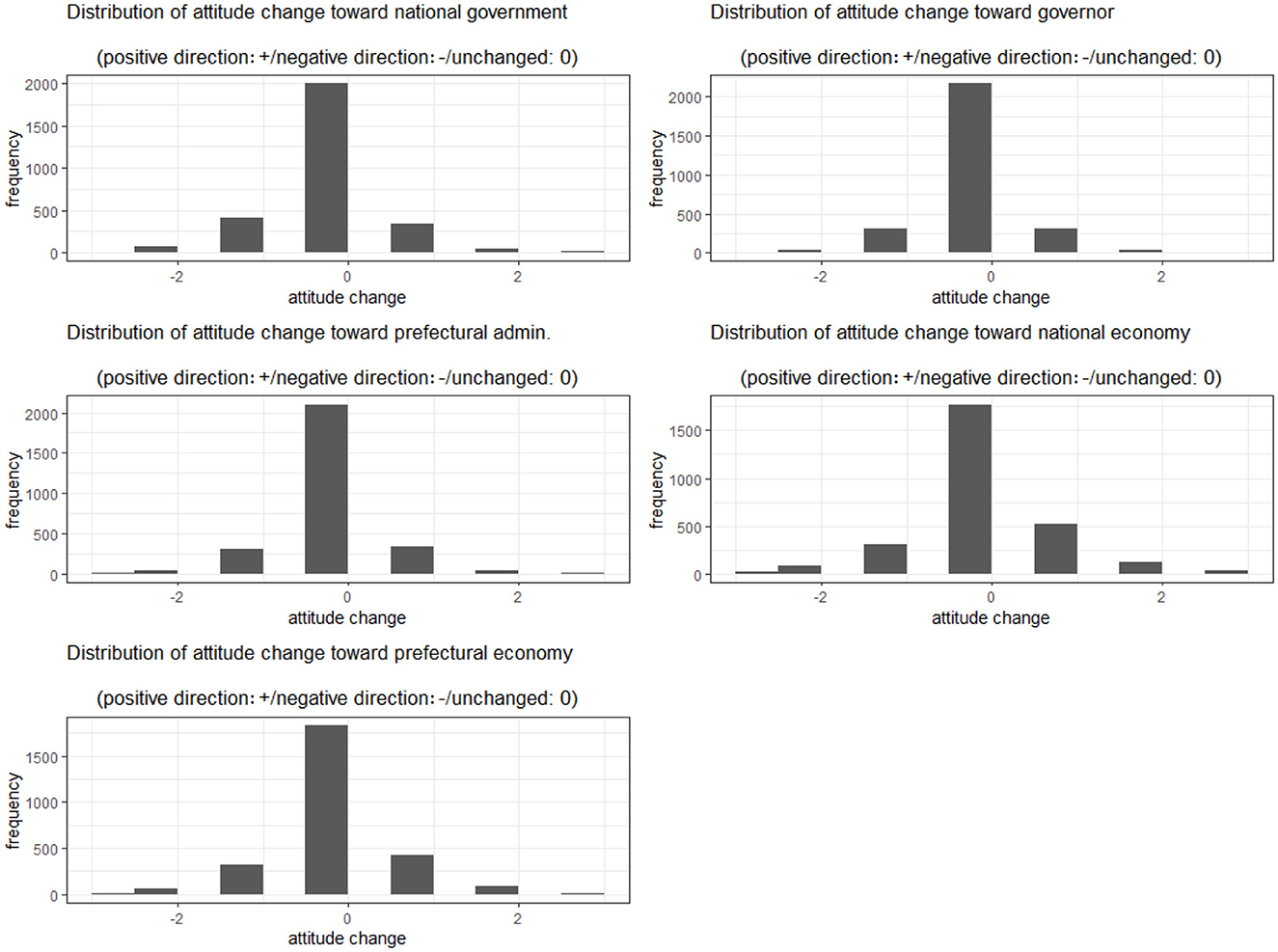
Figure 2. Distribution of change in attitude score toward political actors and their economic status (distribution of outcome variables). While 0 represents unchanged, negative values represent a change in the negative direction, and positive values represent a change in the positive direction.
The estimation is performed by calculating the mean difference in the CAS. The analysis of the mean differences comprises five patterns (national government approval/governor approval/prefectural administration approval/national economy evaluation/prefectural economy evaluation) of the overall analysis (1). To show that the CAS differs by the prefecture of residence and receipt of benefits, I examine the mean difference in the CAS between the two subgroups of (2) “lives in one of the four specific prefectures” and “lives in other prefectures” and (3) “uses one or more subsidy” and “does not use a subsidy.”
The initial sample division aims to compare the difference in the CAS between prefectures with high exposure to governor information and those without. I examine how the CAS altered for participants residing in prefectures where the governor's performance was considered distinctive and those where it was not. Therefore, I measure the difference in the CAS between participants residing in four specific prefectures—Hokkaido, Tokyo, Aichi, and Osaka—and those who did not reside in these prefectures. By focusing on the various types of subsidies given during the pandemic, furthermore, this study assumes that the more directly individuals receive targeted private goods, the more naïve they become in favor of political actors. Whether subsidies were received was indicated by the response with the options of “used,” “planning to use,” “not used,” or “don't know” (Appendix B describes the types of subsidies in detail). A group variable is coded 1 when one or more answers are “used” or “planning to use” and 0 otherwise. Based on the dummy variables, I can simply examine how the probability of the CAS differs between the receiving and non-receiving groups.
Furthermore, I employ a simulation based on ordered logit analysis to ascertain the likelihood of selecting a positive, unaltered, or negative change in the political actor/economic evaluations, in addition to the analysis of mean comparisons. For the pooled analysis, the first difference (FD) in selection probability between the outcomes of reading a positive vignette and not, and between reading a negative vignette and not, will be computed and plotted. Furthermore, in the subcategory analysis, regarding those who read the positive or negative vignette and those who did not, the FD of each selection probability is illustrated for residents of the four prefectures and non-residents, as well as for subsidy recipients and non-recipients. This enables a more precise assessment of the effects of positive and negative vignettes on individuals' performance and economic evaluation.
4 Empirical results
Figures 3, 4, 7, 8, 11, 12 show the difference-in-mean plots for the positive and negative changes in attitude toward political actors and the corresponding economic policies via vignettes. Each figure includes the CAS toward the Japanese government and governor and government of the prefecture of residence, plotted by the good news vignette (positive vignette), bad news vignette (negative vignette), and control group. Each point represents the mean value, and the error bar represents the 95% confidence interval. Figures also display the outcomes of the t-test results of the difference in means between any two groups.
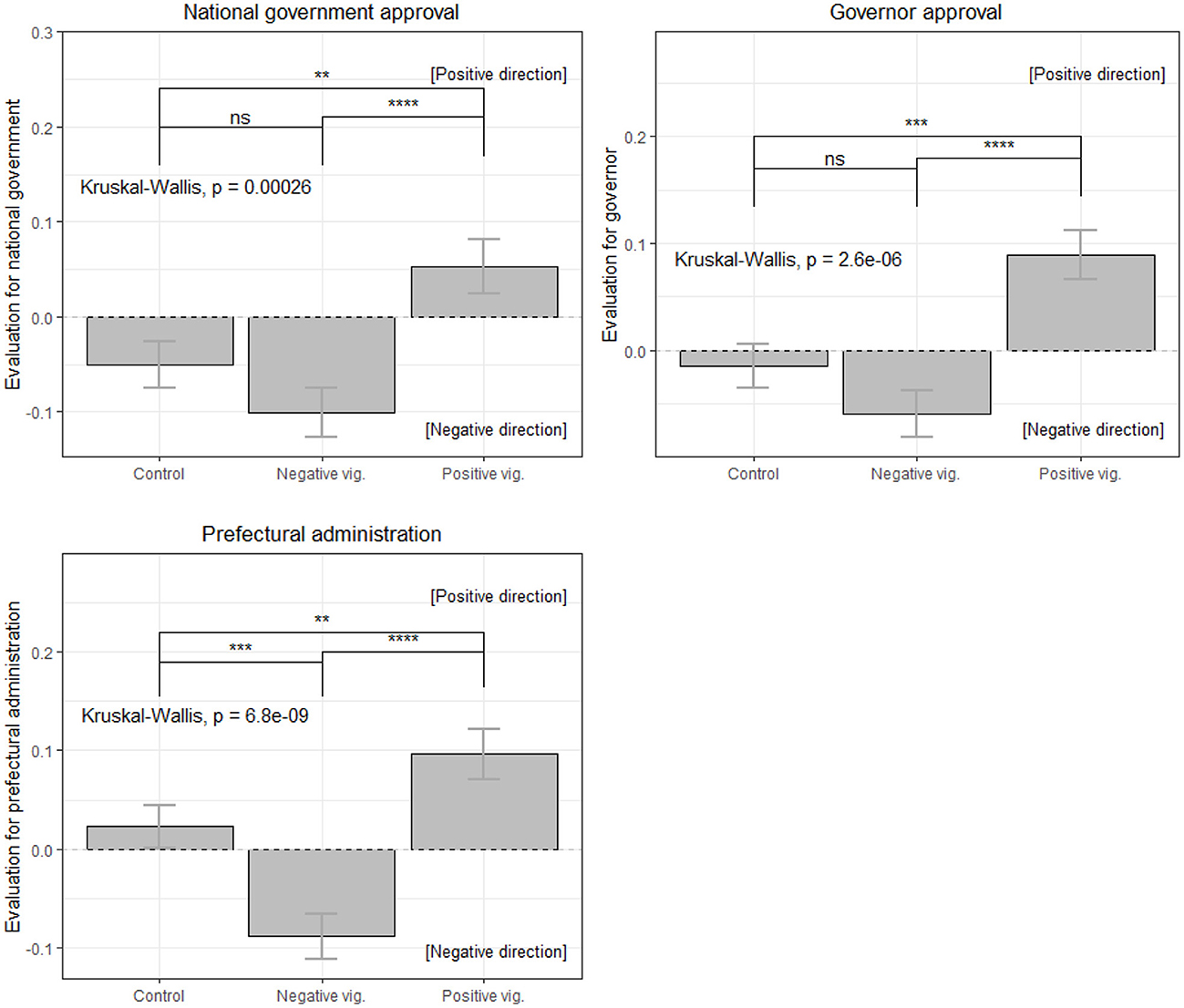
Figure 3. Mean difference in change in attitude score (political actors: overall). The figure displays the means by treatment group. Bars represent 95% confidence intervals. ****p < 0.001, ***p < 0.01, **p < 0.05, *p < 0.1, and ns. means not significant based on the Kruskal-Wallis test results.
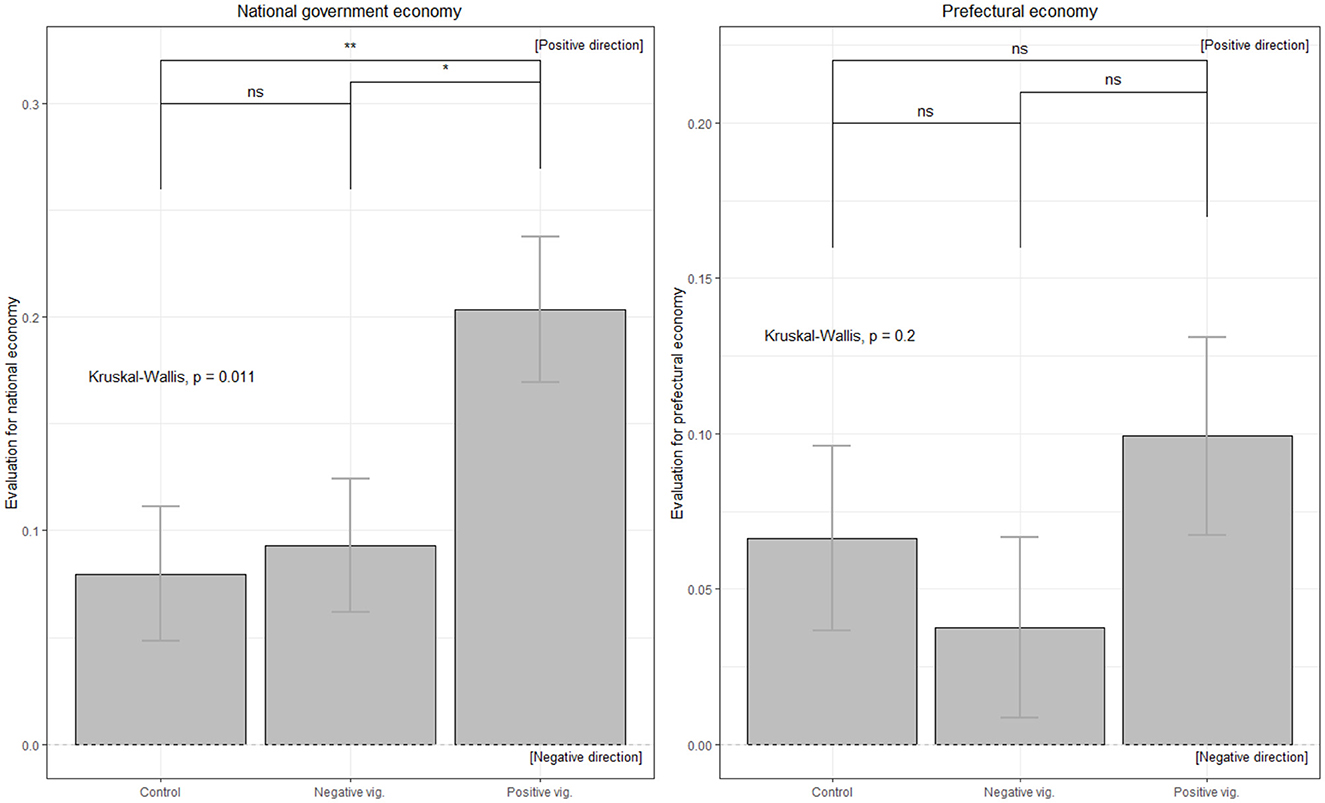
Figure 4. Mean difference in change in attitude score (economic evaluation: overall). See note in Figure 2. ****p < 0.001, ***p < 0.01, **p < 0.05, *p < 0.1, and ns. means not significant based on the Kruskal-Wallis test results.
The mean value, calculated using the CAS ranging from −4 to 4, signifies whether attitudes are inclined to shift in a positive or negative direction. A change in the positive direction is more probable when the mean is situated in the positive direction; conversely, a change in the negative direction is more probable when the mean is situated in the negative direction. Additionally, the confidence interval is considered; in the event that its value cannot be ruled out as zero, it signifies a low probability of an attitude change occurrence.
Furthermore, Figures 5, 6, 9, 10, 13, 14 represent the FD of the probability of choice for each option based on the ordered logit estimation; taking Figure 4 as an example, the square dots represent the result of national government approval. Dots also refer to the FD of the probability of choice with respect to the evaluation to negative direction, positive direction, and no change, respectively, when the positive vignette was read or not read. Each point is drawn based on 50% of 1,000 simulated values and the error bars are drawn based on the lower 2.5% and upper 97.5% of values.
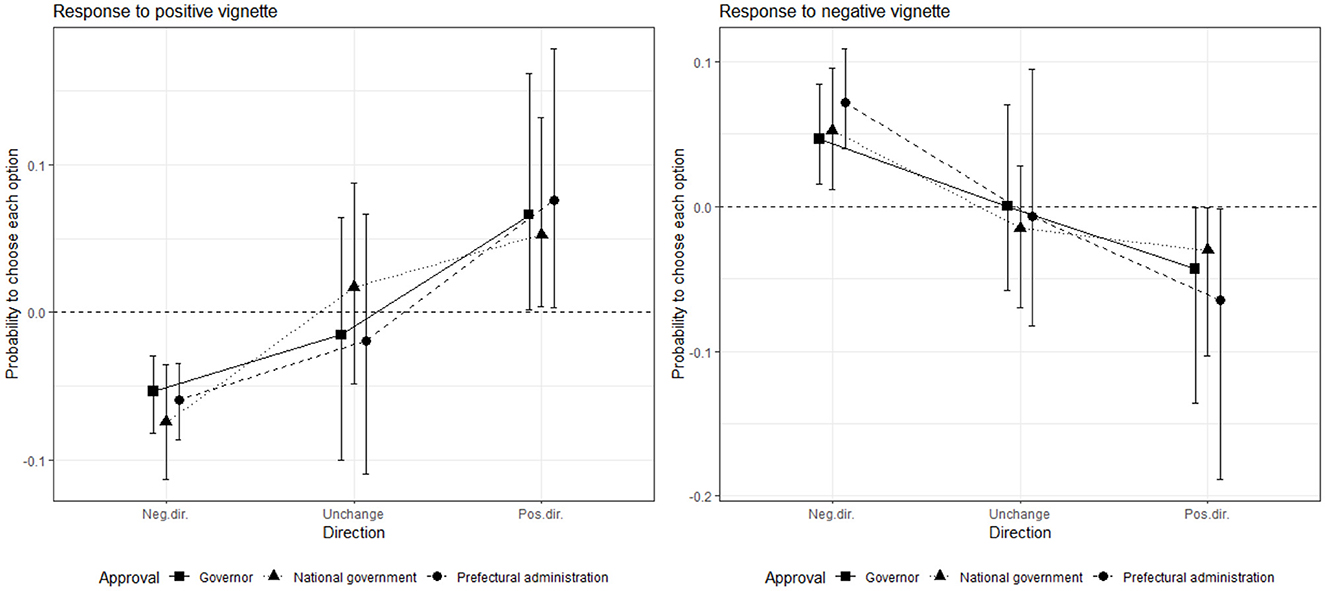
Figure 5. First difference of the probability of choosing each option based on ordinal logit estimation (political actors: overall). The estimation relies on an ordinal logit model. Each point is the first difference value of the probability of choosing the respective option between reading positive vignette or not/negative vignette or not, corresponding to the 50% value of the 1,000 simulated values. The error bars were plotted using the lower 2.5th percentile and the top 97.5th percentile of the simulated data. The dependent variable, which encompasses the ratings for national government, governor, and prefectural administration, is assigned a number of +1 if there is a positive change, −1 if there is a negative change, and 0 if there is no change. Pos.dir. denotes a shift toward the positive direction, while Neg.direction denotes a shift toward the negative direction.
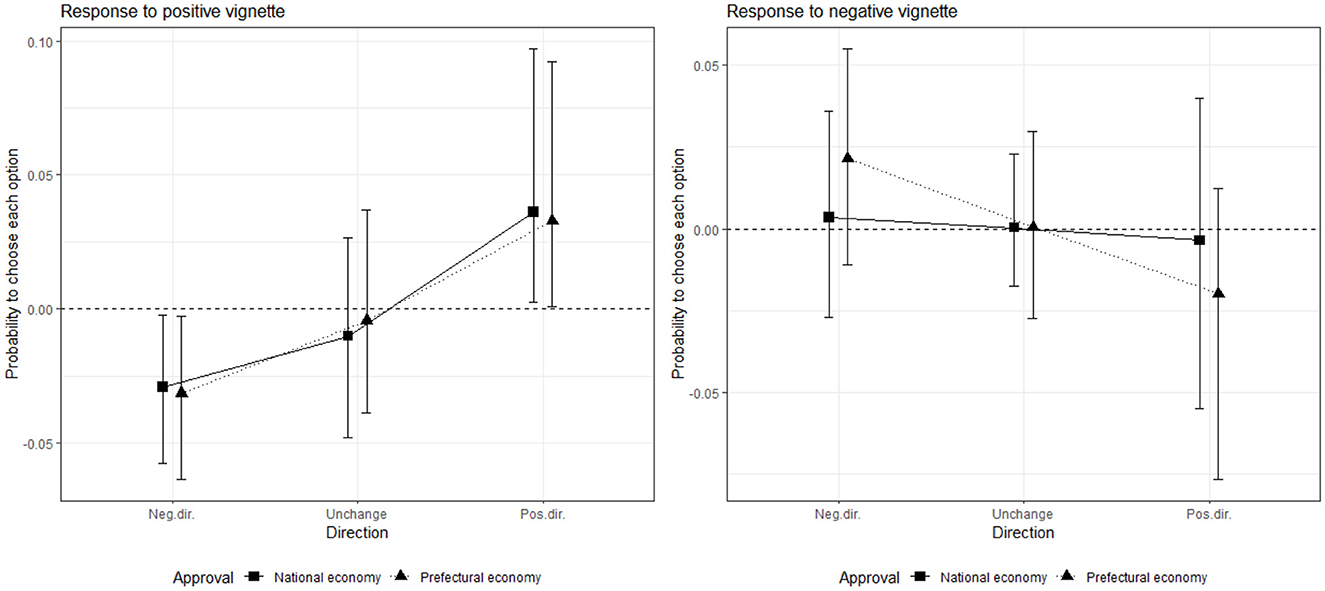
Figure 6. First difference of the probability of choosing each option based on ordinal logit estimation (political actors: overall). See note in Figure 4.
4.1 Pooled analysis
First, the outcomes of the pooled overall analysis are presented in Figure 3 (approval for political actors) and Figure 4 (economic evaluation), in which the sample is not subdivided into categories. The group given information that infectious diseases were not spreading had a significantly higher probability of changing their level of support for the Japanese government, prefectural governor, and prefectural administration in a positive direction than the control group given irrelevant information. Upon examining the positive vignette pertaining to infectious diseases in Figure 3, I see that support for each political entity increases statistically significantly by 0.109 points from the results for the national government in the top left, 0.102 points from the results for the governor in the top right, and 0.098 points from the results for the prefectural administration in the bottom left. Conversely, negative vignettes with information that infectious diseases were spreading yielded the following results: a 0.051-point decrease for the national government, a 0.051-point decrease for the governor, and a 0.116-point decrease for the prefectural administration. Decreasing support for each political actor from the negative vignette effect is evident. These findings unequivocally corroborate Hypotheses 1. With the exception of the prefectural administration, the findings indicate that positive information spillovers regarding infectious diseases had a more pronounced impact on bolstering support for a political actor compared to negative information spillovers, which led to increased disapproval. Despite this positive/negative information on infectious diseases only, the effect of information on the number of infections extends to the evaluation of political actors.
Moreover, Figure 4 intriguingly shows that economic evaluations are also impacted by information regarding the number of infected individuals: participants exposed to the positive vignette shifted their support for the national economy by 0.196 points in the positive direction. The impact on the economy at the prefectural level was marginally altered by ~0.033 points, yet it is evident that the positive vignette has a substantial significance for the economy at the national level. Contrastingly, contrary to the theoretical prediction, negative information does not lead to a negative economic evaluation. Based on the results from positive/negative vignettes, Hypothesis 2 is supported for the positive vignette, but not for the negative vignette. The findings indicate that individuals have a tendency to associate positive news regarding the number of infected individuals with the intersection of economic evaluation, despite the fact that this has no direct bearing on the economic situation.
The results thus far indicate that significant differences in the mean CAS were found in the case of success bias regarding the infection. This result suggests that the propagation of optimistic information about infectious diseases is more likely to affect voters' cognitive mechanisms. Furthermore, information on an improvement in infection status is shown to easily increase support for leaders at the cabinet and prefectural levels. Moreover, it is confirmed that information about the infection influences the likelihood of approving the economic policies led by political actors, even when no other information is available.
As in Figure 5, the FD of choice probabilities using ordinal logit estimation unambiguously validates the findings of the mean comparison analysis in relation to the outcomes for political actors. When reading positive vignettes, the likelihood of shifting support toward any political actor is higher. The likelihood of a shift toward the positive direction is ~5% higher when reading positive information. The negative vignettes indicate that the assessment of the local administration is nearly 10% more prone to shift toward a negative direction. Hence, it is evident that regardless of the positive or negative nature of the information regarding infectious diseases, it immediately impacts the assessment of every political actor.
However, in terms of economic evaluation, it is evident that the FD is statistically significant and different from zero only in relation to positive vignettes and national-level (not local-level) economic evaluation in Figure 6. The outcome is relatively marginal: the impact of the negative vignette is nearly negligible. Regarding economic information, only positive information leads to an increased economic assessment. Nevertheless, favorable information regarding infectious diseases has been demonstrated to impact the assessment of the economy, albeit limited to the national level.
4.2 Results by prefecture
The outcomes are then analyzed by partitioning the sample by residential area. The outcomes of support for political actors and economic evaluation are presented in Figures 7, 8, respectively, in relation to whether the residential area is among the four prefectures where the governor receives the most media attention. The lighter-colored bands in the figure correspond to inhabitants of the four prefectures. In particular, “control group information x non-residents of the four prefectures” is set as a reference group; “control group x residents of the four prefectures,” “positive vignette x residents of the four prefectures,” and “negative vignette x residents of the four prefectures” constitute pairs for comparisons. The results of the t-test are displayed in the figures.
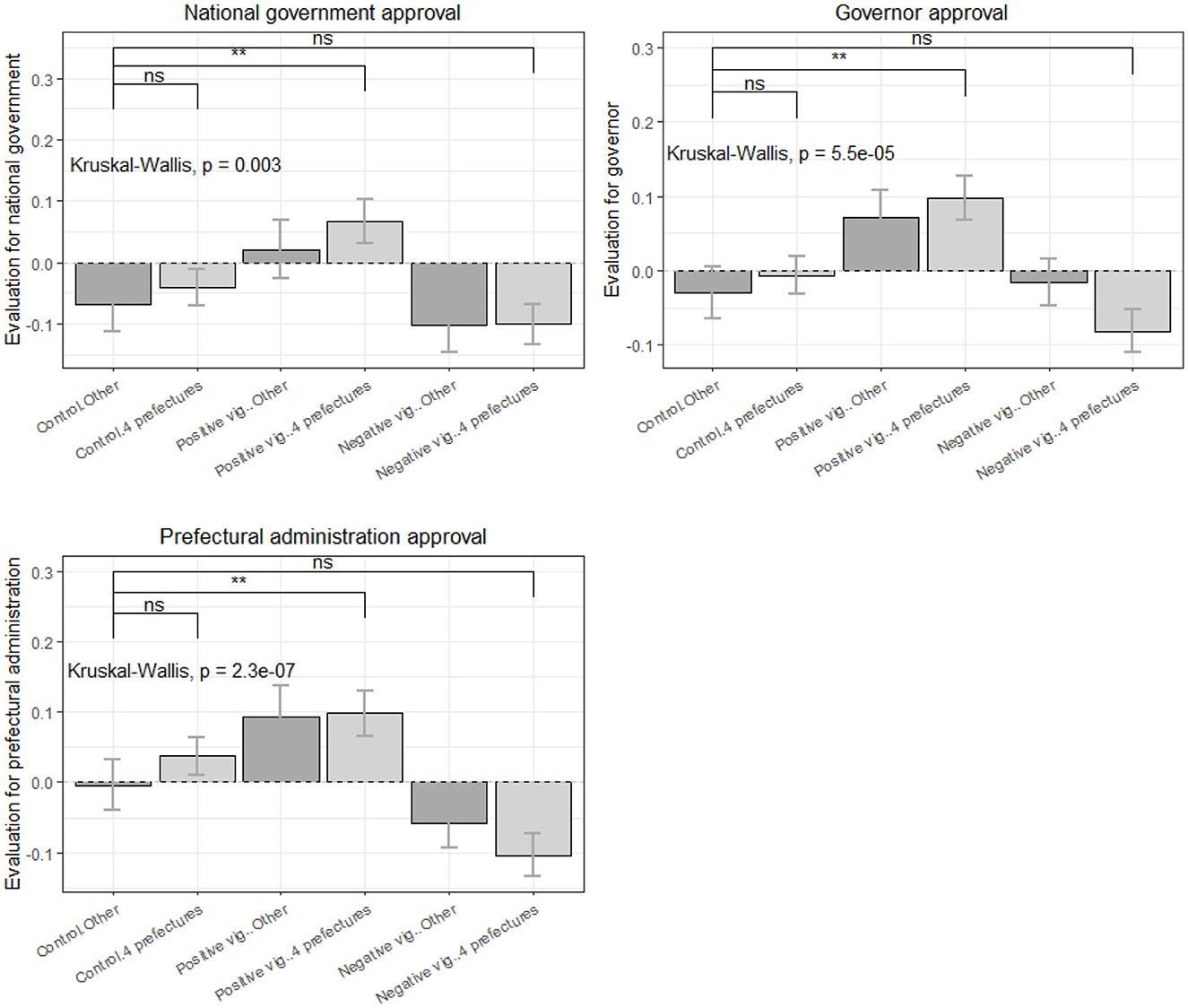
Figure 7. Mean difference in change in attitude score (political actors: by prefecture). See note in Figure 2. ****p < 0.001, ***p < 0.01, **p < 0.05, *p < 0.1, and ns. means not significant based on the Kruskal-Wallis test results.
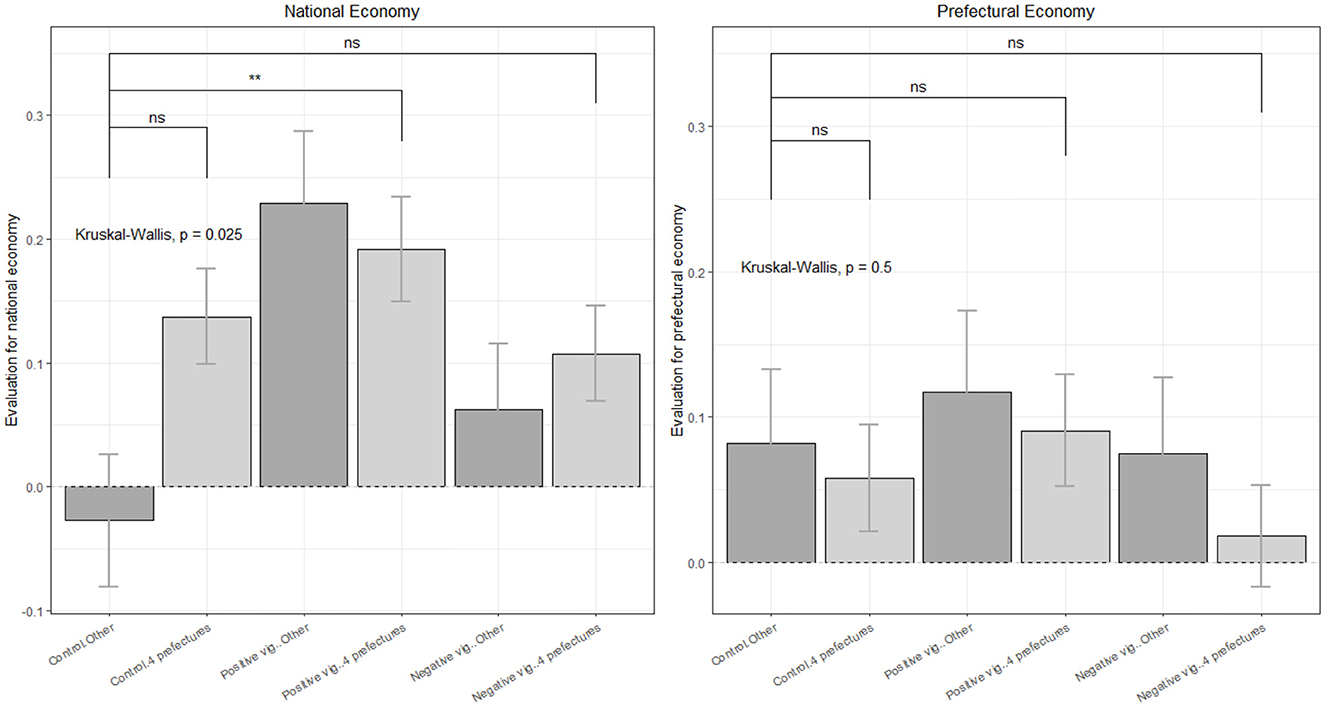
Figure 8. Mean difference in change in attitude score (economic policy: by prefecture). See note in Figure 2. ****p < 0.001, ***p < 0.01, **p < 0.05, *p < 0.1, and ns. means not significant based on the Kruskal-Wallis test results.
The results presented in Figure 7 indicate that among participants who were residents of the four prefectures and viewed the positive vignette, support for the national government, governor, and prefectural administration increased by 0.136, 0.103, and 0.060 points, respectively. These increases are statistically significant when compared to the group of non-residents who viewed unrelated information. Nevertheless, the impact of residing in any of the four prefectures is moderate among groups exposed to identical information. Consequently, residing in any of the four prefectures does not result in an immediate increase in support for the governor, national government, or prefectural administration.
More notably, within the group that viewed the negative vignette, there was no discernible decline in support for the political actor among the residents of the four prefectures. Substantial outcomes were exclusively observed in the form of favorable updates in political perspectives. The statistical significance associated with the negative vignette was not validated; instead, the only finding pertaining to residential area was the positive change in political attitudes. Hence, from these results, Hypothesis 3 is partially supported for the positive vignette but not supported for the negative vignette.
Additionally, while the positive vignette increases support for the national economy among residents of the four prefectures, the effect magnitude is greater among non-residents of those prefectures. Furthermore, no substantial alterations occur in the adverse trajectory concerning detrimental information. Furthermore, with regard to the economic conditions in the prefectures, no statistically significant distinctions are observed among any of the categories. These results show that Hypothesis 4 is not supported.
Figures 9, 10 illustrate the comparison of the FD between residents and non-residents in the four prefectures. Slightly different from Figures 5, 6, each plot is segmented into cases where positive information was read and negative information was read. Unlike the results obtained from the comparison of means, there are no findings indicating that residing in the four prefectures leads to a greater inclination toward the positive direction when viewing positive information and the negative direction when viewing negative information. As FD analysis by simulation includes confounders, it is considered more rigorous. Therefore, the influence of residence in the four prefectures where there is more information on the good performance of governors is considered limited.
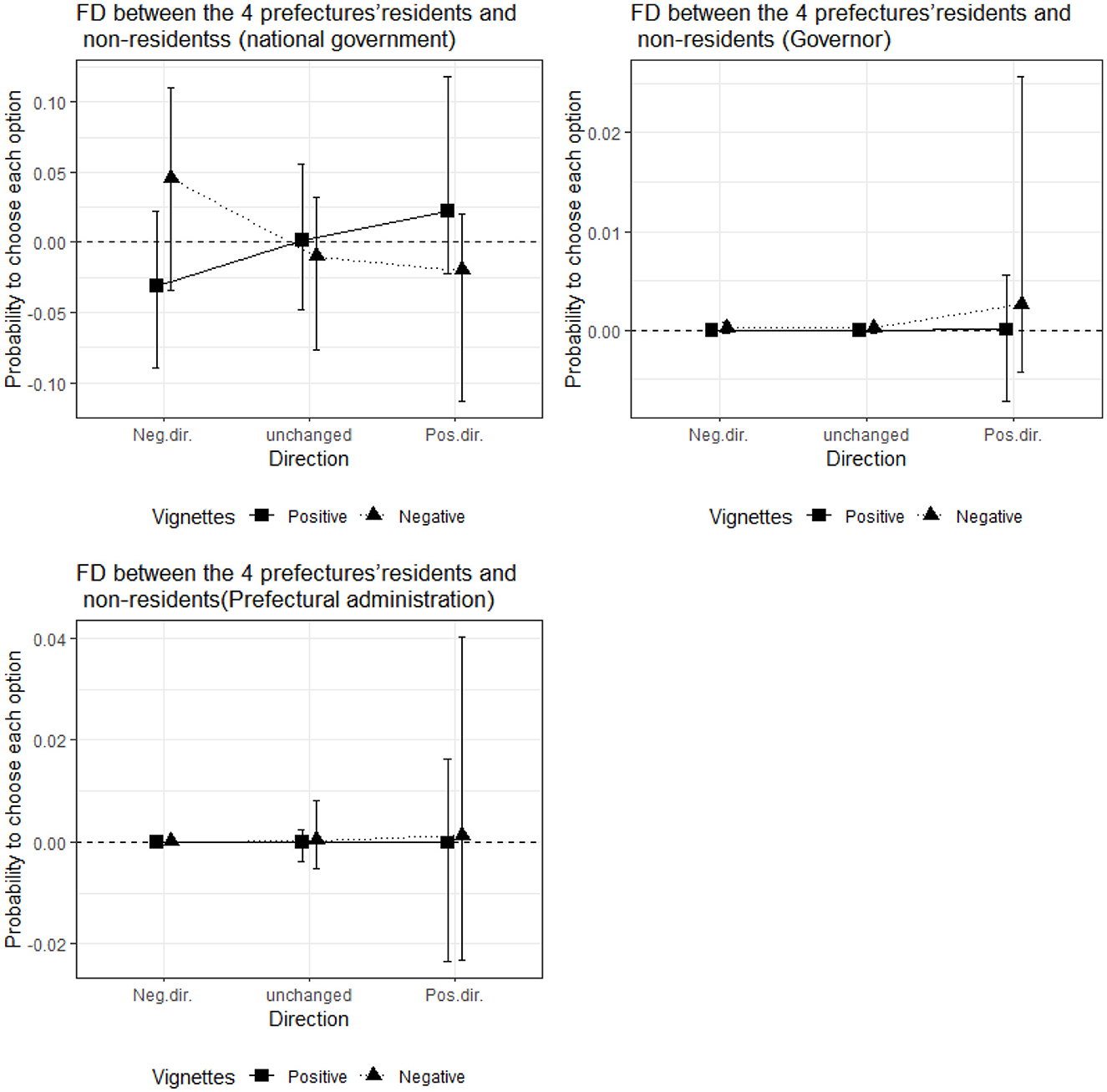
Figure 9. First difference of the probability of choosing each option based on ordinal logit estimation (political actors: by prefectures). FD, first difference. The estimation relies on an ordinal logit model. Each point is the first difference value of the probability of choosing the respective option between residents/non-residents of four prefectures when reading positive or negative vignettes, corresponding to the 50% value of the 1,000 simulated values. The error bars were plotted using the lower 2.5th percentile and the top 97.5th percentile of the simulated data. The dependent variable, which encompasses the ratings for national government, governor, and prefectural administration, is assigned a number of +1 if there is a positive change, −1 if there is a negative change, and 0 if there is no change. Pos.dir. denotes a shift toward the positive direction, while Neg.direction denotes a shift toward the negative direction.
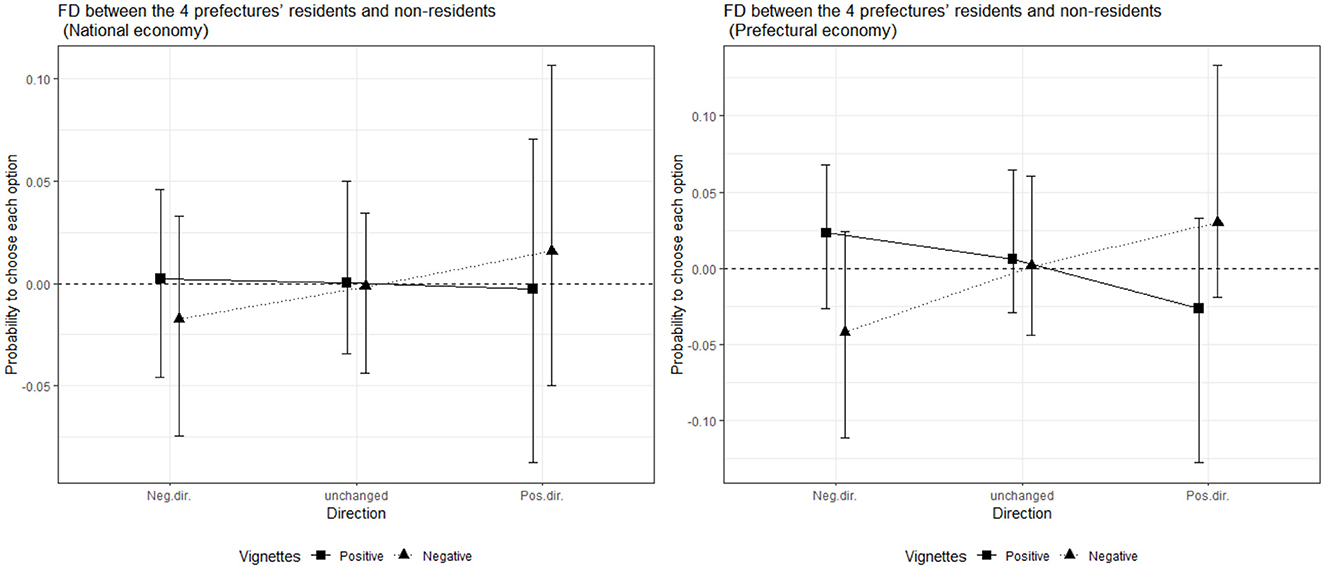
Figure 10. First difference of the probability of choosing each option based on ordinal logit estimation (economic evaluations: by prefectures). See note in Figure 8.
4.3 Results of the analysis on the receipt of subsidies
Finally, I depict the results according to whether or not the participants received subsidies. Figures 10, 11 illustrate the support for a political actor and economic evaluation, respectively, based on whether or not participants received a subsidy. According to Figure 11, those who receive subsidies and are exposed to a positive vignette are more inclined to enhance their endorsement of the governor. Individuals who receive a subsidy and observe a positive vignette demonstrate a 0.2% point increase in the level of support. The magnitude of this shift is evidently greater than that of the other outcomes. Nevertheless, there is no more evidence to substantiate the claim that receiving subsidies primarily leads to an increase in support for the government or economic assessment. These results are also confirmed in the findings depicted in Figure 12, which pertains to economic evaluation. According to studies, receiving subsidies in Japan does not affect the degree of support for the government. The results suggest that Japanese voters demonstrate a limited response, even when they directly receive personalized things that are expressly designed to meet their individual requirements.
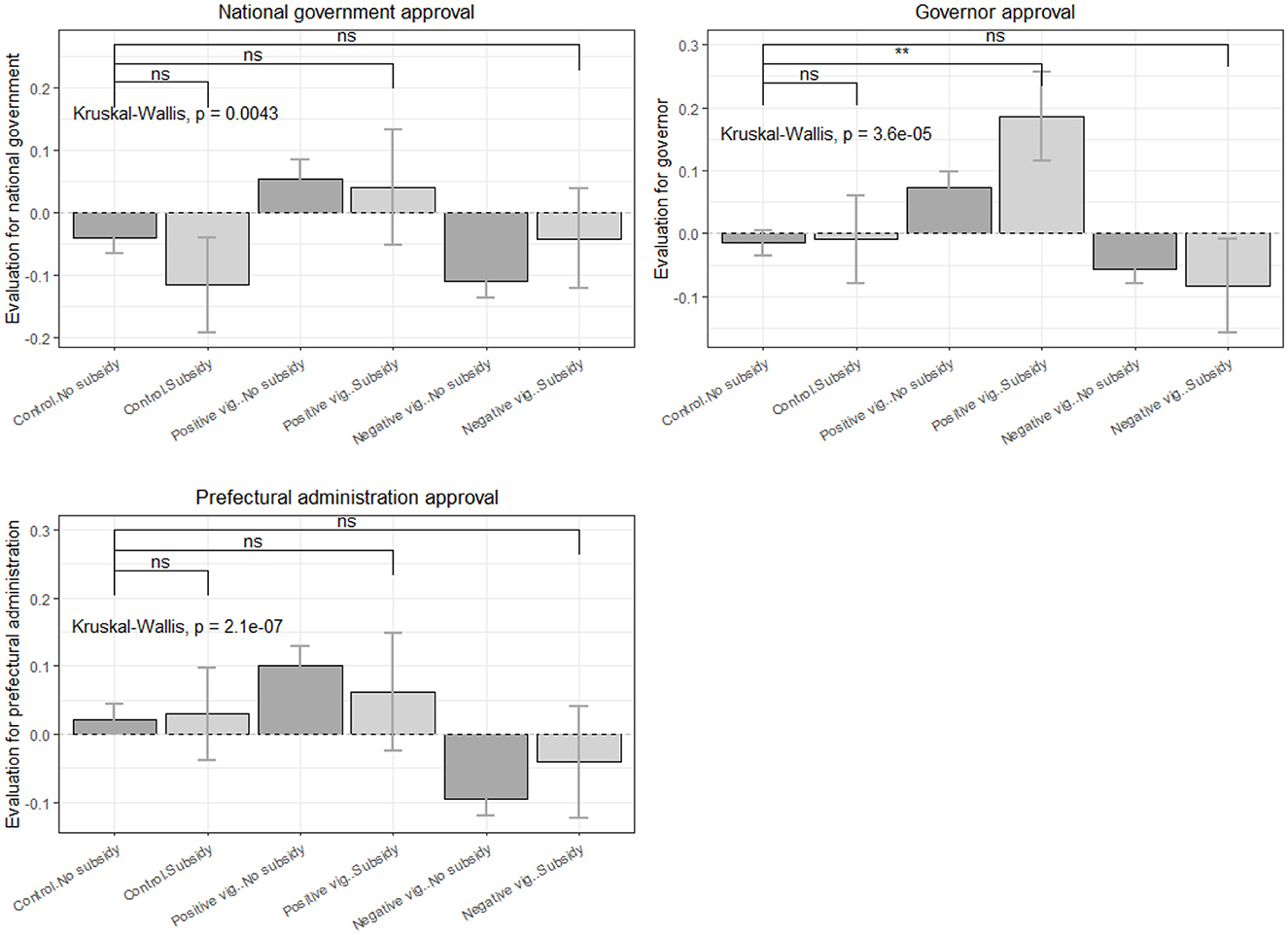
Figure 11. Mean difference in change in attitude score (political actors: by subsidy). See note in Figure 2. ****p < 0.001, ***p < 0.01, **p < 0.05, *p < 0.1, and ns. means not significant based on the Kruskal-Wallis test results.
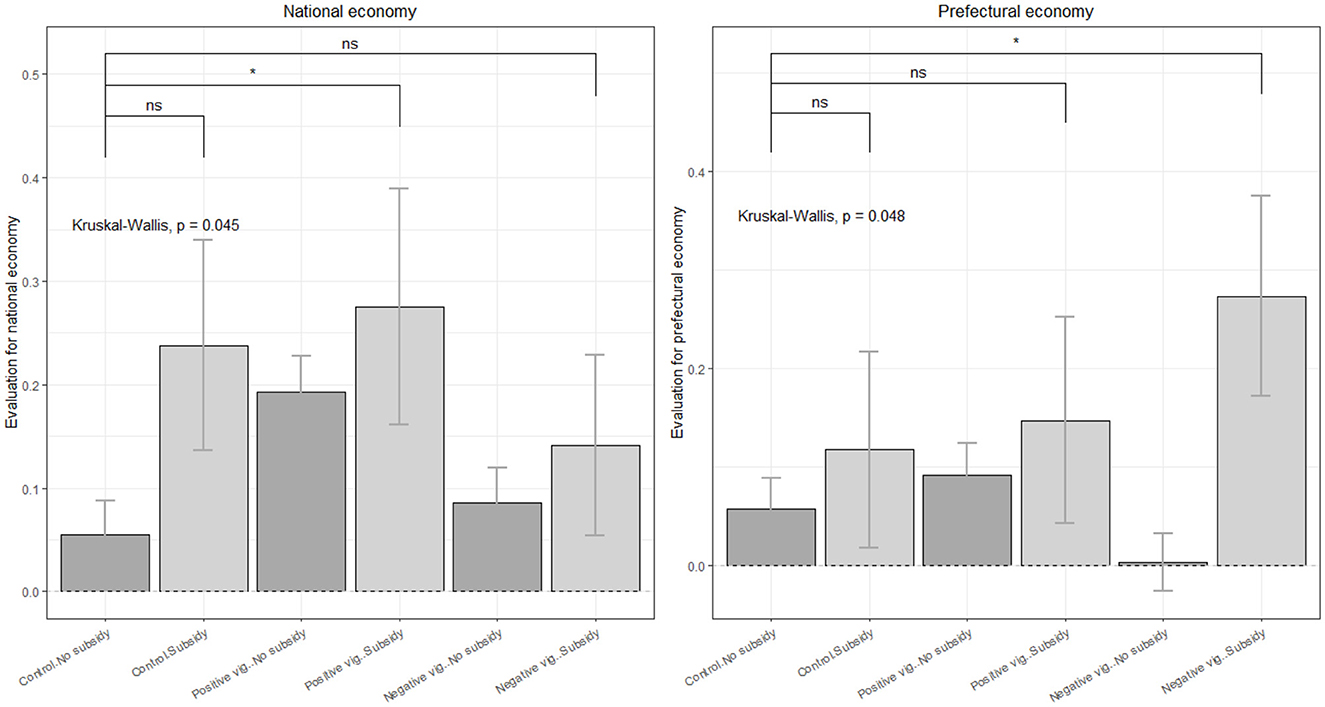
Figure 12. Mean difference in change in attitude score (economic policy: by subsidy). See note in Figure 2. ****p < 0.001, ***p < 0.01, **p < 0.05, *p < 0.1, and ns. means not significant based on the Kruskal-Wallis test results.
Additionally, the findings for the FD depicted in Figures 13, 14 exhibit a resemblance to those in Figures 11, 12, suggesting that the receipt or absence of subsidies does not exert any influence on the assessment of the government or its economic standing. Furthermore, considering the more stringent outcomes for the FD, the impact of receiving subsidies on the governor's level of support may also be constrained. Hence, both Hypotheses 5 and 6 are not supported by these estimations.
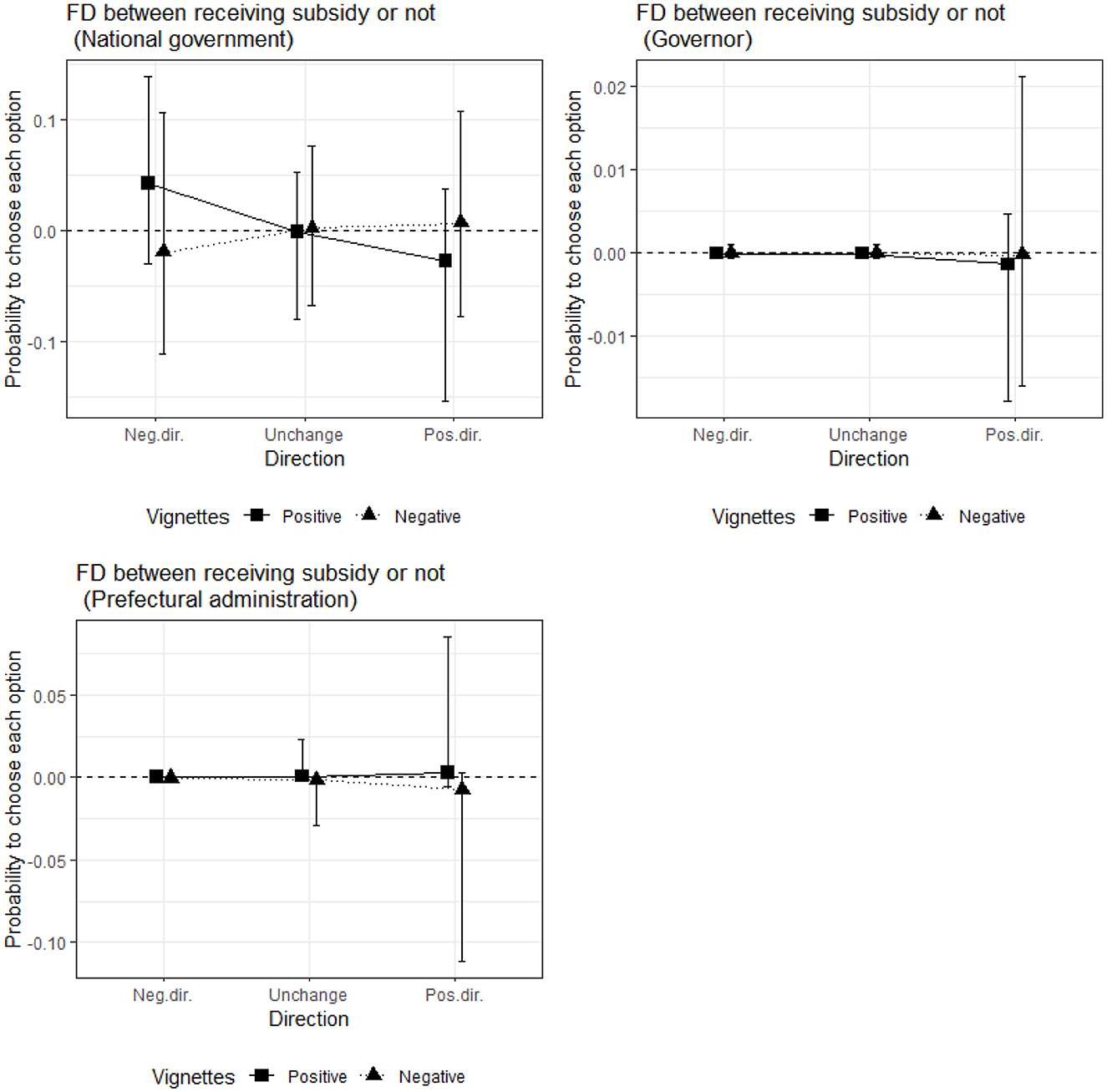
Figure 13. First difference of the probability of choosing each option based on ordinal logit estimation (political actors: by subsidy). FD, first difference. The estimation relies on an ordinal logit model. Each point is the first difference value of the probability of choosing the respective option between subsidy recipients/non-recipients when reading positive or negative vignettes, corresponding to the 50% value of the 1,000 simulated values. The error bars were plotted using the lower 2.5th percentile and the top 97.5th percentile of the simulated data. The dependent variable, which encompasses the ratings for national government, governor, and prefectural administration, is assigned a number of +1 if there is a positive change, −1 if there is a negative change, and 0 if there is no change. Pos.dir. denotes a shift toward the positive direction, while Neg.direction denotes a shift toward the negative direction.
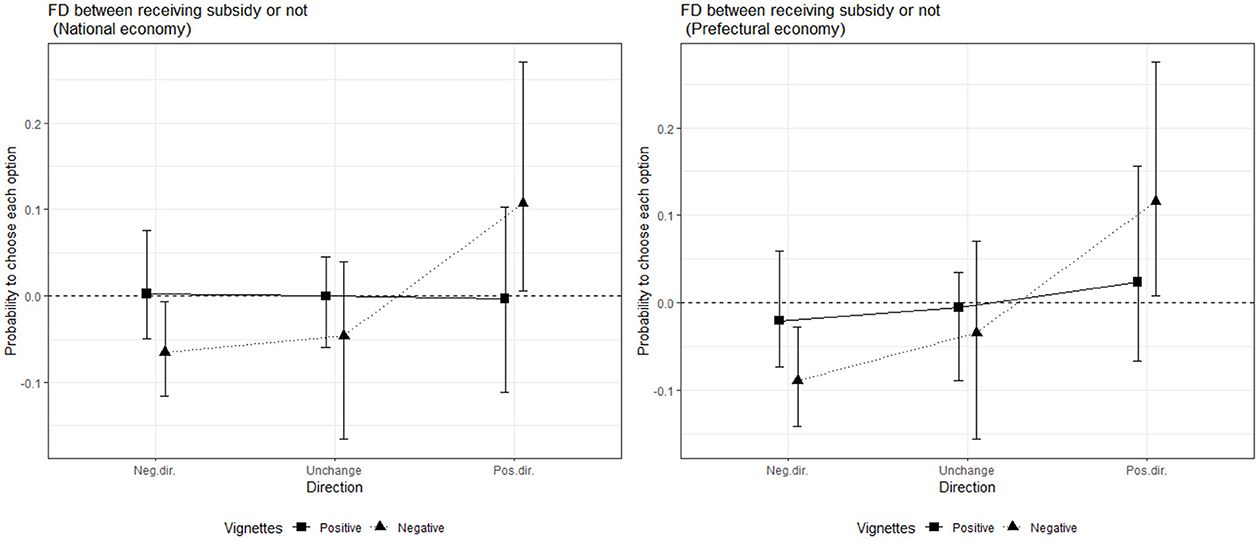
Figure 14. First difference of the probability of choosing each option based on ordinal logit estimation (economic evaluations: by prefectures). See note in Figure 12.
5 Discussion
This study examines the effect of life-threatening events, not originally caused by government performance, on voters' government support and economic evaluations. The result indicates that both positive and negative information solely focused on the transmission of infectious diseases has an impact on political support and economic assessment. This aligns with prior research indicating that voters tend to make attribution errors when reacting to occurrences such as natural disasters, in which the cause of the event cannot be attributed to government performance. However, in Japan, there is no evidence to suggest that the approval of national and local governments or retrospective evaluation is influenced by private goods that have specific objectives and are directly targeted to specific (groups of) voters. Japanese voters exhibit cognitive bias, which is evident in their evaluation of government performance and economic situations, attributed to the repercussions of natural disasters. Japanese voters appear to have difficulty distinguishing between non-human-induced instabilities that are unrelated to the government and human-induced instabilities caused by the government. As a result, they encounter difficulties in making a sophisticatedly scrutinized government assistance and economic evaluation. Nevertheless, potentially more significant cognitive biases do not appear to occur when individuals are exposed to repetitive information from the media or when confronted with pork barrel politics. I can find no evidence of cognitive bias in reaction to mass media priming (residents of four prefectures) or as a direct reaction to economic interest (subsidy acceptance).
Furthermore, the results extend beyond only offering implications concerning cognitive biases in the retrospective evaluation of Japanese voters. Several other nations have demonstrated that individuals exhibit greater receptiveness toward programmatic partisan-biased/clientelistic policies implemented by incumbents, not limited to the context of the COVID-19 pandemic. These studies have repeatedly examined the programmatic incumbent support hypothesis (PISH), which consistently demonstrates a pattern of individuals responding to benefits tailored to specific voters and groups (Manacorda et al., 2011; Pop-Eleches and Pop-Eleches, 2012; Zucco, 2013; Kogan, 2021).12 As revealed in PISH-related studies, voters reselect incumbents as a kind of recognition for policies that directly benefit recipients. The issue with reselecting the incumbent government as a form of recompense for such a policy feedback is that it undermines and distorts electoral accountability.
When weighed against the PISH literature regarding programmatic Japanese respondents, this study does not directly offer supportive evidence that receiving subsidies increases the likelihood of supporting the incumbent. These negative PISH findings are consistent with recent studies in Japanese economic voting. Ohmura (2023) demonstrated that even among individuals who received the tax exemption for disaster damage (Zassonkoujo), support for the incumbent government was not enhanced. My analysis aligns with the literature, and suggests that the presence of PISH-like functions in Japan is restricted, even in the COVID-19 context.
6 Conclusions
This study examined the cognitive bias caused by COVID-19—as a catastrophic disaster—on people's political attitudes. The results of the online survey experiment revealed that participants naively changed their approval attitudes toward political actors and economic policies, such as national-level governments, prefectural governors and governments, and national and prefectural economic policies, although they were only given information on infectious diseases. While I found that the positive or negative infection information typically influenced respondents' retrospective evaluations, residents of prefectures in large urban areas, where governors frequently revealed more information on infection through the media, were unlikely to experience attitude changes. While it is anticipated that the increase in information provided by governors in these regions will promote the development of positive attitudes, the analysis does not substantiate this theoretical claim. Even when participants received COVID-19-related subsidies in the form of explicitly targeted private goods from the government, favorable changes in attitude were still unlikely to occur. These findings suggest that individuals in Japan are less likely to have cognitive bias, even when they are often exposed to information priming on infectious data in specific prefectures and offered benefits from policies that directly target specific voters.
Previous studies have pointed out that people's cognition is affected by large disasters, but the resulting increase in information and impact of economic support, at least for COVID-19 information in Japan, did not cause such reactions. More importantly, my findings suggest the difficulty people experience in differentiating discriminate between human and non-human errors surrounding COVID-19 or between political and non-political errors and then deciding in favor of political actors and policies. The degree to which COVID-19 affects our cognitive mechanisms is likely to be greater than that of natural disasters such as earthquakes and floods. This is because of the more immediate and geographically and temporally widespread nature of the looming threat to life—even in Japan, where the number of infections, serious illnesses, and deaths by COVID-19 remained lower than in other countries. In Western, South American, and South Asian countries with greater exposure to infectious diseases, information about infections may lead to more frequent updates of political attitudes. Regardless of the normative significance of the instability of people's retrospective evaluations, the results of this analysis imply that information transmission from the mass media can easily lead to naive changes in individuals' political attitudes and bring about political instability at the aggregate level.
Despite the media's framing of political actors' capabilities and the expectation that political attitudes are vulnerable to an increase in myopic tendencies depending on the receipt of benefits, I could not include the differences in responses among different types of funding (e.g., free grants, allowances, and interest-free loans). The difference in responses to subsidies in the pure sense and interest-free loans remains an issue to be considered in future analyses. Although this study was limited to the level of political attitudes as the outcome variables, future research should extend the scope to the COVID-19 infection status and incumbent political actors' performance in elections, as these factors are expected to influence voting behaviors and choices. In Japan, COVID-19 has been reclassified from a category 2 infectious disease to a category 5 infectious disease. The threat of the disease is now regarded as limited. While the appearance of new variants has resulted in reports of limited medical resources owing to local outbreaks, COVID-19 may no longer pose the same level of hazard to individual cognitions as it did previously. Further investigation should prioritize the execution of a replication or follow-up study to ascertain any changes that have transpired from the onset of COVID-19 in 2020 to the present.
Data availability statement
The original contributions presented in the study are included in the article/Supplementary material, further inquiries can be directed to the corresponding author.
Ethics statement
The studies involving humans were approved by Kwansei Gakuin University Ethics Committee. The studies were conducted in accordance with the local legislation and institutional requirements. The participants provided their written informed consent to participate in this study.
Author contributions
HO: Conceptualization, Data curation, Formal analysis, Funding acquisition, Investigation, Methodology, Project administration, Resources, Software, Validation, Visualization, Writing—original draft, Writing—review & editing.
Funding
The author(s) declare financial support was received for the research, authorship, and/or publication of this article. This study was supported by Japan Society for Promotion of Science: 22K01320, 23H00040, and 21H00682.
Conflict of interest
The author declares that the research was conducted in the absence of any commercial or financial relationships that could be construed as a potential conflict of interest.
Publisher's note
All claims expressed in this article are solely those of the authors and do not necessarily represent those of their affiliated organizations, or those of the publisher, the editors and the reviewers. Any product that may be evaluated in this article, or claim that may be made by its manufacturer, is not guaranteed or endorsed by the publisher.
Supplementary material
The Supplementary Material for this article can be found online at: https://www.frontiersin.org/articles/10.3389/frsps.2024.1333871/full#supplementary-material
Footnotes
1. ^A related line of research deals with the issue of the calculated inaction by national or local governments (McConnell and 't Hart, 2019; Zahariadis et al., 2021). Governments may have an incentive to not act or delay action when an event occurs. Those that determine that an event is not the fault of political actors may delay their initial response or, in some cases, control information, betting that the situation will subside over time (McConnell and 't Hart, 2019). COVID-19 and other infectious disease control measures are prone to such situations (Zahariadis et al., 2021). In Japan, the early silence and shrill insistence on infection control by prefectural governors, as described herein, are considered examples of the combination of political inaction and the construction of a narrative to justify it. However, this study deals with the issue of calculated inaction by the government and does not examine the distortions in voters' decision-making because of inaction and deception.
2. ^With the spread of COVID-19, a growing body of research began to focus on its psychosocial aspects (Cerami et al., 2020). In Italy, for example, PsyCovid longitudinal data were collected to track the impact of the spread of COVID-19 on psychosocial elements, showing that it had a significant negative effect on the individual cognition of socio-political phenomena. In particular, the impact of the pandemic on economic evaluations has been emphasized. COVID-19 affected not only macroeconomic dynamics such as fiscal and monetary policies but also microeconomic trends such as corporate behavior. It also influenced the cognitive mechanisms through which individuals perceive economic conditions and, in turn, evaluate governments and their economic policies (Giommoni and Loumeau, 2020; Lipscy, 2020; Bagus et al., 2021; Piotrowski, 2021).
3. ^Although it is difficult to use the difference-in-differences method and other intervention designs based on the spread of the infection per se, several studies have examined lockdowns using regression discontinuity designs (Schraff, 2020) and political support (Bol et al., 2021) and political trust (Esaiasson et al., 2020) using survey experiments.
4. ^As discussed later, a related study is on politicians' media exposure and the associated retrospective evaluations (i.e., DellaVigna and Kaplan, 2007). A representative study that focuses on the tone of media coverage rather than the frequency of media exposure is that of Clark et al. (2018), who found that favorable media coverage improves economic evaluations and heals the negative relationship between unemployment and approval ratings.
5. ^Such media exposure not only influenced voters' political attitudes but also significantly impacted their economic behavior (Konishi et al., 2021). For example, when the governor of Osaka Prefecture mentioned the possibility of killing the COVID-19 virus with iodine, iodine became scarce in the marketplace (Japan Times, 2020a). While this study does not focus on such a distortion of economic behavior, this incident shows the considerable influence of some prefectural governors in Japan.
6. ^In Japan, large hospitals are operated by various entities other than the local administration, including the National Hospital Organization, Japan Organization of Occupational Health and Safety, Japan Community Healthcare Organization, municipalities, the Japanese Red Cross Society, and social welfare organization Saiseikai Imperial Gift Foundation, Inc. Although the number of beds in hospitals under the local administrative agency is not particularly high, the prefectural governor and mayor of the municipality have a considerable influence on hospitals.
7. ^Exceptions were allowed in cases where (i) the tax return had not been completed, (ii) a new company was established in 2019, (iii) the company was incorporated between the last year and this year, (iv) no tax return was filed in 2019, (v) a sole proprietorship was newly established, (vi) a business succession took place, and (vii) a disaster occurred, but the number of cases falling under these categories is small.
8. ^In Japan, however, interest-free or low-interest loans by national or local governments are widely used, especially by recipients ineligible for the benefit subsidy (Asahi Shimbun, 2021). Considering the properties of such loans, which are goods that can be acquired in the present but are likely to become liabilities in the future, the change in attitude by loan users is not expected to be as simple as that of benefit recipients. In Japan, it is not a simple choice between receiving and not receiving benefits; it is also necessary to consider a third option: the change in attitude of loan users. Future studies should aim to verify this issue.
9. ^Appendix B describes the types of subsidies in detail.
10. ^Another study, for example, suggests that the provision of benefits increases not only government support but also political legitimacy (Mazepus and van Leeuwen, 2020).
11. ^Online Appendix A contains more detailed information: the descriptive statistics of respondents' varying variables and demographic compositions compared with the census.
12. ^Although numerous studies have been conducted on the PISH, some refute this mechanism; see Blattman et al. (2018), Imai et al. (2020), and Catalinac and Muraoka (2023).
References
Achen, C. H., and Bartels, L. M. (2018). Democracy for Realists. Princeton University Press. doi: 10.1515/9781400888740
Achen, C. H., Bartels, L. M., Achen, C. H., and Bartels, L. M. (2018). Democracy for Realists. Princeton, NJ: Princeton University Press.
Acuña-Duarte, A. A., and Salazar, C. A. (2021). Conditioning factors for re-election and incumbency advantage after a natural disaster: evidence from a large-scale earthquake. J. Dev. Stud. 57, 1585–1592. doi: 10.1080/00220388.2021.1887477
Alexander, C. S., and Becker, H. J. (1978). The use of vignettes in survey research. Publ. Opin. Quart. 42, 93–104. doi: 10.1086/268432
Bagus, P., Peña-Ramos, J. A., and Sánchez-Bayón, A. (2021). COVID-19 and the political economy of mass hysteria. Int. J. Environ. Res. Publ. Health 18, 1–15. doi: 10.3390/ijerph18041376
Bechtel, M. M., and Hainmueller, J. (2011). How lasting is voter gratitude? An analysis of the short- and long-term electoral returns to beneficial policy. Am. J. Polit. Sci. 55, 852–868. doi: 10.1111/j.1540-5907.2011.00533.x
Bechtel, M. M., and Mannino, M. (2020). Retrospection, fairness, and economic shocks: how do voters judge policy responses to natural disasters? Polit. Sci. Res. Methods 10, 1–19. doi: 10.1017/psrm.2020.39
Blattman, C., Emeriau, M., and Fiala, N. (2018). Do anti-poverty programs sway voters? Experimental evidence from Uganda. Rev. Econ. Stat. 100, 891–905. doi: 10.1162/rest_a_00737
Bodet, M. A., Thomas, M., and Tessier, C. (2016). Come hell or high water: an investigation of the effects of a natural disaster on a local election. Elect. Stud. 43, 85–94. doi: 10.1016/j.electstud.2016.06.003
Bol, D., Giani, M., Blais, A., and Loewen, P. J. (2021). The effect of COVID-19 lockdowns on political support: some good news for democracy? Eur. J. Polit. Res. 60, 497–505. doi: 10.1111/1475-6765.12401
Bovan, K., Banai, B., and Banai, I. P. (2018). Do natural disasters affect voting behavior? Evidence from Croatian floods. PLoS Curr. 10:7. doi: 10.1371/currents.dis.cbf57c8ac3b239ba51ccc801d3362c07
Bullock, J. G., and Lenz, G. (2019). Partisan bias in surveys. Ann. Rev. Polit. Sci. 22, 325–342. doi: 10.1146/annurev-polisci-051117-050904
Cameron, L., and Shah, M. (2015). Risk-taking behavior in the wake of natural disasters. J. Hum. Resour. 50, 484–515. doi: 10.3368/jhr.50.2.484
Carlin, R. E., Love, G. J., and Zechmeister, E. J. (2014). Natural disaster and democratic legitimacy: the public opinion consequences of Chile's 2010 earthquake and tsunami. Polit. Res. Quart. 67, 3–15. doi: 10.1177/1065912913495592
Cassar, A., Healy, A., and von Kessler, C. (2017). Trust, risk, and time preferences after a natural disaster: experimental evidence from Thailand. World Dev. 94, 90–105. doi: 10.1016/j.worlddev.2016.12.042
Catalinac, A., and Muraoka, T. (2023). How incumbent politicians respond to the enactment of a programmatic policy: evidence from snow subsidies. Japan. J. Polit. Sci. 24, 41–63. doi: 10.1017/S1468109922000378
Cerami, C., Santi, G. C., Galandra, C., Dodich, A., Cappa, S. F., Vecchi, T., et al. (2020). Covid-19 outbreak in Italy: are we ready for the psychosocial and the economic crisis? Baseline findings from the PsyCovid Study. Front. Psychiatry 11:1. doi: 10.3389/fpsyt.2020.00556
Clark, W. R., Golder, M., and Golder, S. N. (2018). Principles of Comparative Politics. New York, NY: CQ Press.
Cole, S., Healy, A., and Werker, E. (2012). Do voters demand responsive governments? Evidence from Indian disaster relief. J. Dev. Econ. 97, 167–181. doi: 10.1016/j.jdeveco.2011.05.005
Daniele, G., Martinangeli, A., Passarelli, F., Sas, W., and Windsteiger, L. (2020). Wind of Change? Experimental Survey Evidence on the COVID-19 Shock and Socio-Political Attitudes in Europe (August 11, 2020). Working Paper of the Max Planck Institute for Tax Law and Public Finance No. 2020-10. Available online at: https://ssrn.com/abstract=3671674 (accessed January 24, 2024).
DellaVigna, S., and Kaplan, E. (2007). The Fox News effect: media bias and voting. Quart. J. Econ. 122, 1187–1184. doi: 10.1162/qjec.122.3.1187
Eckel, C. C., El-Gamal, M. A., and Wilson, R. K. (2009). Risk loving after the storm: a Bayesian-Network study of Hurricane Katrina evacuees. J. Econ. Behav. Org. 69, 110–124. doi: 10.1016/j.jebo.2007.08.012
Esaiasson, P., Sohlberg, J., Ghersetti, M., and Johansson, B. (2020). How the coronavirus crisis affects citizen trust in institutions and in unknown others: evidence from 'the Swedish experiment. Eur. J. Polit. Res. 60, 748–760. doi: 10.31235/osf.io/6yw9r
Fowler, A., and Hall, A. B. (2018). Do shark attacks influence presidential elections? Reassessing a prominent finding on voter competence. J. Polit. 80, 1423–1437. doi: 10.1086/699244
Giommoni, T., and Loumeau, G. (2020). Lockdown and Voting Behaviour: A Natural Experiment on Postponed Elections during the COVID-19 Pandemic. Available online at: https://ssrn.com/abstract=3659856 (accessed July 24, 2020).
Hainmueller, J., Hangartner, D., and Yamamoto, T. (2015). Validating vignette and conjoint survey experiments against real-world behavior. Proc. Natl. Acad. Sci. U. S. A. 112, 2395–2400. doi: 10.1073/pnas.1416587112
Healy, A., and Malhotra, N. (2009). Myopic voters and natural disaster policy. Am. Polit. Sci. Rev. 103, 387–406. doi: 10.1017/S0003055409990104
Healy, A., and Malhotra, N. (2013). Retrospective voting reconsidered. Ann. Rev. Polit. Sci. 16, 285–306.
Healy, A. J., Malhotra, N., and Mo, C. H. (2010). Irrelevant events affect voters' evaluations of government performance. Proc. Natl. Acad. Sci. U. S. A. 107, 12804–12809. doi: 10.1073/pnas.1007420107
Heersink, B., Peterson, B. D., and Jenkins, J. A. (2017). Disasters and elections: estimating the net effect of damage and relief in historical perspective. Polit. Anal. 25, 260–268. doi: 10.1017/pan.2017.7
Huber, G. A., Hill, S. J., and Lenz, G. S. (2012). Sources of bias in retrospective decision making: experimental evidence on voters' limitations in controlling incumbents. Am. Polit. Sci. Rev. 106, 720–741. doi: 10.1017/S0003055412000391
Imai, K., King, G., and Velasco Rivera, C. (2020). Do nonpartisan programmatic policies have partisan electoral effects? Evidence from two large-scale experiments. J. Polit. 82, 714–730. doi: 10.1086/707059
Iwasaki, A., and Grubaugh, N. D. (2020). Why does Japan have so few cases of COVID-19?. EMBO Mol. Med. 12:e12481. doi: 10.15252/emmm.202012481
Japan Times (2020a). Experts Shoot Down Osaka Governor's Claim That Gargling Helps Beat Virus. Tokyo: The Japan Times.
Japan Times (2020b). Japan to Lift Coronavirus State of Emergency in 39 Prefectures. Tokyo: The Japan Times.
Japan Times (2020c). Japan's Governors Under the Spotlight as Coronavirus Pandemic Rages. Tokyo: The Japan Times.
Japan Times (2021a). No One's Safe Anymore: Osaka Crumples Under COVID-19 Onslaught. Tokyo: The Japan Times.
Japan Times (2021b). Suga Expected to Declare Second Emergency for Tokyo Area. Tokyo: The Japan Times.
Katafuchi, Y., Kurita, K., and Managi, S. (2021). COVID-19 with stigma: theory and evidence from mobility data. Econ. Disast. Clim. Change 5, 71–95. doi: 10.1007/s41885-020-00077-w
Katz, G., and Levin, I. (2016). The dynamics of political support in emerging democracies: evidence from a natural disaster in Peru. Int. J. Publ. Opin. Res. 28, 173–195. doi: 10.1093/ijpor/edv010
Kitschelt, H., and Wilkinson, S. I. (2007). “Citizen-politician linkages: an introduction,” in Patrons, Clients and Policies: Patterns of Democratic Accountability and Political Competition, eds. H. Kitschelt and S. I. Wilkinson (New York, NY: Cambridge University Press). doi: 10.1017/CBO9780511585869
Kogan, V. (2021). Do welfare benefits pay electoral dividends? Evidence from the national food stamp program rollout. J. Polit. 83, 58–70. doi: 10.1086/708914
Koike, O., and Wright, D. S. (1998). Five phases of intergovernmental relations in Japan: policy shifts and governance reform. Int. Rev. Admin. Sci. 64, 203–218. doi: 10.1177/002085239806400204
Konishi, Y., Saito, T., Ishikawa, T., Kanai, H., and Igei, N. (2021). How did Japan cope with COVID-19? Big data and purchasing behavior. Asian Econ. Pap. 20, 146–167. doi: 10.1162/asep_a_00797
Lipscy, P. Y. (2020). COVID-19 and the politics of crisis. Int. Org. 74, E98–E127. doi: 10.1017/S0020818320000375
Louviere, J. J., Hensher, D. A., and Swait, J. D. (2000). Stated Choice Methods: Analysis and Applications. Cambridge: Cambridge University Press.
Lu, N., Cheng, K. W., Qamar, N., Huang, K. C., and Johnson, J. A. (2020). Weathering COVID-19 storm: successful control measures of five Asian countries. Am. J. Infect. Contr. 48, 851–852. doi: 10.1016/j.ajic.2020.04.021
Malhotra, N., and Kuo, A. G. (2008). Attributing blame: the public's response to Hurricane Katrina. J. Polit. 70, 120–135. doi: 10.1017/S0022381607080097
Malhotra, N., and Kuo, A. G. (2009). Emotions as moderators of information cue use. Am. Polit. Res. 37, 301–326. doi: 10.1177/1532673X08328002
Malhotra, N., and Margalit, Y. (2014). Expectation setting and retrospective voting. J. Polit. 76, 1000–1016. doi: 10.1017/S0022381614000577
Manacorda, M., Miguel, E., and Vigorito, A. (2011). Government transfers and political support. Am. Econ. J. 3, 1–28. doi: 10.1257/app.3.3.1
Mazepus, H., and van Leeuwen, F. (2020). Fairness matters when responding to disasters: an experimental study of government legitimacy. Governance 33, 621–637. doi: 10.1111/gove.12440
McConnell, A., and 't Hart, P. (2019). Inaction and public policy: understanding why policymakers “do nothing.” Pol. Sci. 52, 645–661. doi: 10.1007/s11077-019-09362-2
Miura, A., and Kobayashi, T. (2016). Survey satisficing inflates stereotypical responses in online experiment: the case of immigration study. Front. Psychol. 7:1563. doi: 10.3389/fpsyg.2016.01563
Ohmura, H. (2023). Reconsidering the retrospection and cognitive bias in Japan [Seihu heno Gyouseki-hyouka to Ninchi no Yugami nitusite Kangaeru]. ROLES Report, No.28. Available online at: https://roles.rcast.u-tokyo.ac.jp/publication/20231110 (accessed January 24, 2024).
Piotrowski, D. (2021). Shaping the public perception of economic phenomena during the COVID-19 pandemic: priority of goals or values? Eur. Res. Stud. J. 24, 528–564. doi: 10.35808/ersj/2059
Pop-Eleches, C., and Pop-Eleches, G. (2012). Targeted government spending and political preferences. Quart. J. Polit. Sci. 7, 285–320. doi: 10.1561/100.00011017
Ramos, R., and Sanz, C. (2020). Backing the incumbent in difficult times: the electoral impact of wildfires. Comp. Polit. Stud. 469–499. doi: 10.1177/0010414019858959
Remmer, K. L. (2014). Exogenous shocks and democratic accountability: evidence from the Caribbean. Comp. Polit. Stud. 47, 1158–1185. doi: 10.1177/0010414013488563
Schraff, D. (2020). Political trust during the COVID-19 pandemic: rally around the flag or lockdown effects? Eur. J. Polit. Res. 60, 1007–1017. doi: 10.31235/osf.io/pu47c
Singer, M. M., and Carlin, R. E. (2013). Context counts: the election cycle, development, and the nature of economic voting. J. Polit. 75, 730–742. doi: 10.1017/S0022381613000467
Wallander, L. (2009). 25 years of factorial surveys in sociology: a review. Soc. Sci. Res. 38, 505–520. doi: 10.1016/j.ssresearch.2009.03.004
Zahariadis, N., Ceccoli, S., and Petridou, E. (2021). Assessing the effects of calculated inaction on national responses to the COVID-19 crisis. Risk Hazar. Crisis Publ. Pol. 12, 328–345. doi: 10.1002/rhc3.12230
Keywords: COVID-19, cognitive bias, natural disaster, non-/human-induced error, online survey experiment, information availability, retrospection, economic voting
Citation: Ohmura H (2024) Cognitive bias in voters' retrospective evaluations associated with COVID-19: evidence from Japan. Front. Soc. Psychol. 2:1333871. doi: 10.3389/frsps.2024.1333871
Received: 08 November 2023; Accepted: 16 January 2024;
Published: 20 February 2024.
Edited by:
Joaquín Bahamondes, Universidad Católica del Norte, ChileReviewed by:
Shruti Tewari, Indian Institute of Management Indore, IndiaKevin Lanning, Florida Atlantic University, United States
Copyright © 2024 Ohmura. This is an open-access article distributed under the terms of the Creative Commons Attribution License (CC BY). The use, distribution or reproduction in other forums is permitted, provided the original author(s) and the copyright owner(s) are credited and that the original publication in this journal is cited, in accordance with accepted academic practice. No use, distribution or reproduction is permitted which does not comply with these terms.
*Correspondence: Hanako Ohmura, hanakohmura@kwansei.ac.jp
 Hanako Ohmura
Hanako Ohmura